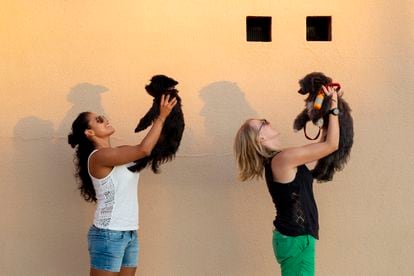With the double hat of a photographer and resident of Poblenou, Gina Pellicer seeks to show, through the portraits of her neighbors, how this neighborhood with an industrial past and which until 30 years ago lived with its back to the sea is "changing by giant steps" .
Proof that the mutation is frenetic is that two protagonists of these images no longer live in the area.
As has happened in other districts of Barcelona, Poblenou has been experiencing a slow but sustained process of replacing residents and traditional businesses for more than a decade with new inhabitants with greater purchasing power and a renewed offer in the premises.
Food chains or restaurants burst in, but also cookie and cupcake shops at 3.85 euros per unit.
It is gentrification: the double-edged knife that improves urban areas and threatens neighborhoods around the world.
Juan Munoz and Encarna Lopez.
25 years in La Gran Bodega in the neighborhood of La Plata, a mini area of Poblenou.
Loving and dear, they not only served food.
They welcomed.
They retired in August and rest peacefully in Sant Adrià del Besòs, a city close to Barcelona. Gina Pellicer
“Many people have left, although there are still lifelong ones.
I don't know how long it will last”, sighs the photographer.
It is enough to put your eyes for a millisecond on each image to guess if its protagonists are new or the usual ones.
“Barcelona is becoming Paris or London, those of us who are from here cannot live in the city.
Who can pay 2,000 euros of rent?
Someone from outside, who works for a foreign company and who, with his arrival, even if it is not premeditated, replaces a neighbor ”.
In the lower part of the neighbourhood, in a new building, there is one flat for sale: a first interior that measures 52 square meters.
They ask for 390,000 euros (7,500 per square meter).
Daniela Hernandez and Marianne Kuijpers.
Mexicans, imposing and fighters, they embody unconditional love and generosity.
His house is always open and there is never a shortage of tequila and chelitas to share.
Daniela is a fitness teacher at a sports center and Marianne is a video editor.Gina Pellicer
In front of the neighborhood cemetery, Nelo lived in a place thanks to an informal agreement with the property.
Of Romanian origin, he works whatever comes out.
The owner decided to sell the premises.
Today it is a supermarket, and Nelo lives in the house of a friend who has given him a room.
They are no longer in the neighborhood Juanillo and Encarna, from La Gran Bodega.
He half his life working in the bar and living in the attic, until they have retired.
Now they rest in the neighboring city of Sant Adrià and with the rent they collect from the premises they complement their retirement.
The bar is already under construction to reopen it with another face and another offer.
Mira and Emilio.
They live their retirement in a ground floor in the microworld of white houses and cobbled streets that surround the Plaza de Prim. They pay just 150 euros.
They are Portuguese and dedicated themselves to street vending to raise 12 children.
They have 58 grandchildren and 38 great-grandchildren. Gina Pellicer
“They are testimonies of a life that disappears, of places where you used to have a beer and now they serve
brunch.
The neighbors don't want
brunch,
we want a coffee with milk or a beer”, snaps Pellicer.
The area where he lives in Poblenou is the micro-neighborhood of La Plata.
Even she considers going to the other end of the city.
To the periphery.
And she says it eating a menu in the bar below her house.
It's fashionable and there are days when she can't sit down, it's taken over by tourists.
The tourist pressure on Poblenou is not as strong as in the centre, in the Ciutat Vella neighbourhoods, where there are streets where the residents are an endangered species, making daily journeys is an odyssey and the butchers and hardware stores already they do not exist, replaced by supermarkets open 24 hours a day,
souvenir shops,
luggage storage or scooter and bike rentals.
Monica Carbonell.
She is one of the newest neighbors in the neighborhood.
She is the founder and director of Sodabites, a brand strategy and cultural transformation consultancy for companies.
She works at Impact Hub, one of the coworking spaces that have proliferated in Poblenou.Gina Pellicer
The paradox in the portraits in this photo-essay is that some of the new inhabitants know that their arrival has probably been at the cost of the departure of old neighbors.
Edu and Robert are from Girona and they arrived at Poblenou expelled from Ciutat Vella.
They left reluctantly, although they immediately fell in love with Poblenou.
They are fully aware of the phenomenon of gentrification: "Hence our obsession with creating a neighborhood, a community, going to the usual bar, not buying
muffins
and avoiding the behavior of people who don't even speak Spanish," says Edu.
They have established such a relationship with their environment that they frequently visit Mrs. María, a former upstairs neighbor who now lives in a nearby residence.
Some of the oldest portrayed, however, do not share the nostalgia of Poblenou before.
Perhaps the prices were cheap and there was traditional trade.
But also substandard housing, dirt, "factories and transport companies", recalls Juanillo.
Or bad smells, Antonio remembers.
Nothing is ever perfect.
Neither now.
Some of the new neighbors live in premises or industrial buildings that have been converted but are not legalized as housing.
Barbara Martinez.
She has been teaching stretching classes on the beach for 32 years.
One hour, five days a week.
She is 86 years old and does not look it.
She travels from Santa Caterina, in Ciutat Vella, from where she attends the changes to the city's maritime façade.Gina Pellicer
Robert Lopez and Eduardo Ballester.
Urbanites at first glance, they claim to be "farmers".
They are from Girona and have lived in Poblenou for four years after living in Ciutat Vella.
Robert is a tour guide.
Edu is a graphic designer and founder of the sustainable clothing brand OWL.
Gina Pellicer
Gabriel Carrio.
Father Biel is a parish priest in two churches in the neighborhood.
Great conversationalist, it is not difficult to end up taking some Aperol with him.
With inexhaustible discussion topics, it is possible to talk about the New Testament or the latest musical trends.
Able to pronounce phrases like “I love Chinese techno”. Gina Pellicer
Luke Huber.
Swiss.
She came to Poblenou in search of good public schools for her daughters.
She has worked for Ferran Adrià designing dishes and founded Manual Thinking, a company that sells planning kits.
She likes to end the day at El Santet bar with her sketchbook. Gina Pellicer
Fat Jose.
20 years as a metal worker in the neighborhood.
His workshop, on the street that surrounds the cemetery, is full of posters with “scantily clad” women.
For years they were given to him from the Labur hardware store.
He is no longer a customer, but his carpenter neighbor is.
And he gives them to her. Gina Pellicer
Jose Ferrandis and Annie Lelaure.
They arrived from France more than 25 years ago.
They chose Poblenou because it is close to the sea, it was quiet, cheap and because they had family in the neighbourhood.
José is the son of Republican exiles, Annie has always worked on social issues.
Gina Pellicer
Nelo.
It is what everyone understands as a hustler.
Fix TV, make palette, cook paella or plant onions.
For years he has lived in a warehouse given informally by its owner.
Since he sold the premises, transformed into a supermarket, he lives in a friend's house. Gina Pellicer
Anthony Valero.
Owner of Antonio's restaurant, which he runs with his wife and his children.
His tattoos and his collection of cowboy boots are his passion.
He remembers the peculiar smell of the neighborhood and the fog that existed years ago.
It was different from other areas of the city, she says. Gina Pellicer
Michael Gallen.
It is easy to see Miquel dressed in a Barça shirt or a chicken shirt to hand out brochures for a takeaway business.
Culé and loved by everyone in the neighbourhood, he is another of the usual neighbors in Poblenou.Gina Pellicer
Exclusive content for subscribers
read without limits
subscribe
I'm already a subscriber







